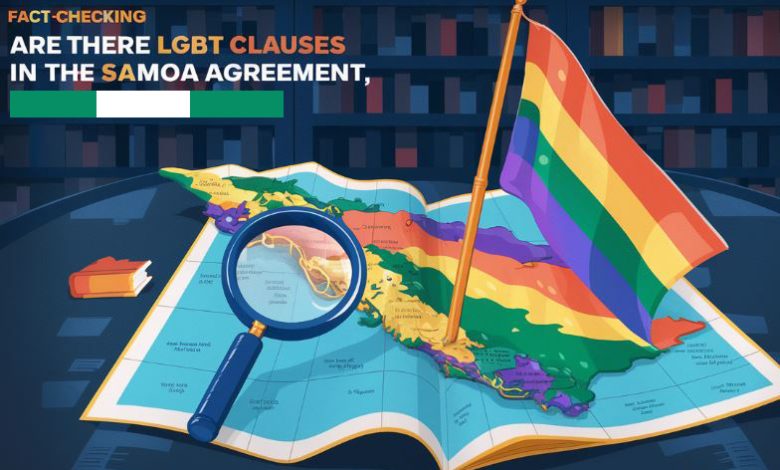FACT-CHECK: Are there LGBT clauses in Samoa Agreement Nigeria signed?

On Thursday, Daily Trust reported concerns by sections of the Nigerian religious and civil society communities over clauses that mandate Lesbian, Gay, Bisexual, and Transgender (LGBT) rights in the $150 billion Samoa Agreement signed by the Nigerian government on 28 June.
The newspaper’s report premised on an opinion article by Sonnie Ekwowusi, a Lagos-based lawyer, was amplified by other news platforms such as BusinessDay, Vanguard and TheCable.
The reports attracted a backlash against the federal government as critics criticised the government for downgrading the country’s moral values in exchange for Western loans.
However, the Nigerian government, in a statement issued by Mohammed Idris, the minister of information and national orientation, on Thursday evening, said the agreement was signed after “extensive reviews and consultations by the Interministerial Committee, convened by the Federal Ministry of Budget and Economic Planning (FMBEP) in collaboration with the Ministry of Foreign Affairs (MFA) and the Federal Ministry of Justice (FMOJ).”
Mr Idris added that the government ensured that “None of the 103 Articles and Provisions of the Agreement contravenes the 1999 Constitution as amended or the laws of Nigeria and other extant Laws.”
The Nigerian government signed the agreement seven months after it was formally signed in Samoa.
The government said it delayed its consent to allow it to carry out a thorough review and ensure no clause in the agreement contravenes Nigerian laws.
“The general public is invited to note that Nigeria was not represented at the Signing Ceremony, which took place in Samoa on Wednesday, 15th November 2023 and hence has not signed the Agreement,” Francisca Omay, the spokesperson for the Ministry of Foreign Affairs, said last year.
“Relevant Nigerian stakeholders are currently studying the instrument to ensure that its provisions do not contravene Nigeria’s domestic legislation,” she added.
In a document seen by PREMIUM TIMES, the Nigerian government made declarations against 13 articles in the signed agreement.
For instance, the Nigerian government, in its declaration concerning Article 9.2, which borders on Human rights, democracy and the rule of law, noted that the Nigerian Constitution has provisions on human rights.
This includes the “prohibition of discrimination in any form and further includes the grounds upon which the National Assembly has and may enact legislations for the advancement of persons within Nigeria who have been politically, socially, economically and educationally disadvantaged by past discriminately laws or practices. This position is also consistent with various United Nations Conventions on Human Rights and discrimination to which Nigeria is a party.”
Other declarations made by the Nigerian government are Article 1 (Objectives), Article 3 (Partnership Dialogue), Article 4 (Policy Coherence), and Article 79 (Cooperation in International Organisations and Forums).
In addition to this, the government also made declarations about Article 19 (Serious crimes of concern to the international community); Article 36 (Gender equality and women and girls’ empowerment); Article 49 (Trade and sustainable development); Article 51 (Trade in services) and Article 97 (Other agreements and arrangements).
Others include Article 101 (Disputes settlement and fulfilment of obligations), Article 22 (Services), Article 40 (Gender equality and empowerment of women), Article 51 (Climate action), and Article 3 (Foreign exchange).
Verifying the claim
PREMIUM TIMES reviewed the 172-page document to find out whether it contains LGBT clauses as claimed by Daily Trust and other newspapers.
Mr Ekwowusi, whose opinion article formed the basis of the newspaper’s report, claimed some articles of the agreement systematically legalise LGBT.
“Certain Articles of the Agreement, especially Articles 2.5 and 29.5 legalise LGBT, transgenderism, abortion, teen sexual abuse, and perversity in African countries,” the Lagos-based lawyer who doubles as the Chairman of Human and Constitutional Rights Committee, African Bar Association (AfBA), wrote in his article published by Daily Trust on 3 July.
Mr Ekwowusi’s interpretations of these articles contrast with what we found in the agreement document reviewed by our reporter.
“The Parties shall systematically promote a gender perspective and ensure that gender equality is mainstreamed across all policies,” article 2.5 of the agreement reads without a mention of any sexual orientation as claimed by Mr Ekwowusi.
Similarly, the lawyer slipped in his interpretation of article 29.5: “The Parties shall support universal access to sexual and reproductive health commodities and healthcare services, including for family planning, information and education, and the integration of reproductive health into national strategies and programmes.”
Contrary to the lawyer’s claims amplified by the newspapers, there is no mention of LGBT in the article above.
According to the reviewed document and EU press statements, the Samoa agreement focused on addressing global challenges.
Its objectives aim to contribute to achieving the United Nations (UN) Sustainable Development Goals (SDGs) and the Paris Agreement adopted under the UN Framework Convention on Climate Change.
In one of its press statements, the EU highlighted the priority areas of the agreement to include human rights, democracy and governance, peace and security; human and social development, inclusive, sustainable economic growth and development, environmental sustainability and climate change; and migration and mobility.
PREMIUM TIMES understands that there was a series of negotiations before the agreement was finalised – the Nigerian government’s press statement issued last year and another EU press statement confirmed this.
Emphasising that the parties will commit to promote, protect and fulfil all human rights, be they civil, political, economic, social or cultural, the EU, in the press statement, noted that “some ACP states were reluctant to see the foundation agreement mention sexual orientation and gender identity (LGBTI rights) – an issue on which there are also differences among EU Member States.”
In the statement, the EU referred to the provision of Article 36.2 of the agreement when it says: “As a matter of compromise, the parties will commit to the implementation of existing international agreements – notably the International Conference on Population and Development Programme of Action on sexual and reproductive health and rights, the Beijing Platform on gender equality and their follow-up.”
However, it grumbles that the above wordings “falls short of the EU negotiators’ ambitions.”
PREMIUM TIMES understands that LGBT clauses were contained in the initial draft of the Samoa Agreement, but protests by some member states forced the EU to abolish the clauses in the final document.
This was evident when the EU, in another document, said it welcomes the commitment to promote universal human rights without discrimination based on any ground “but regrets that the Agreement fails to mention explicitly that discrimination could be based on sexual orientation and gender identity.”
The EU went ahead to plead with parties to “avoid any discrimination based on sexual orientation and to put an end to the criminalisation and punishment, including the death penalty, of LGBTI people…”
Conclusion
It is evident that the EU subscribes to the idea of LGBT and wants to co-opt member states of the Samoa Agreement into protecting the rights of LGBT people. But protests by some member states,, including Nigeria, forced it to omit it in the new document uploaded on the EU’s database on 22 December 2023.
When the document was uploaded, Nigeria had yet to sign the agreement, which, according to the EU, took effect earlier this year and will elapse in the next two decades.
Meanwhile, Article 101 of the new agreement is focused on dispute settlement and fulfilment of obligations.
In contrast to what was widely reported in sections of the media, Article 2.2 of the new agreement states that: “Parties reaffirm their commitment to developing friendly relations among nations, based on respect for the principle of sovereign equality among all states, and to refraining from the threat or use of force against the territorial integrity or political independence of any state, or in any other manner inconsistent with the Charter of the United Nations (the UN Charter).”
Nigeria, as a sovereign state under the leadership of former President Goodluck Jonathan, signed into law an act that prohibits same-sex relationships or marriage.
This is why critics argue that Nigeria should not be part of the Samoa Agreement.
These critics were, however, ridiculed by public commentators who argued that such an international agreement, even if signed, must be debated on the floor of the National Assembly as stipulated in Section 12(1) of the Constitution of the Federal Republic of Nigeria, 1999.
Rabiu Yusuf, chairperson, House Committee on Treaties, Protocols and Agreements Chairman, and Asabe Ndahi, a Programme Manager with the Kukah Centre, recently said the National Assembly has yet to be fully involved in the conversation around the Samoa Agreement.
Mr Yusuf, who spoke at a webinar organised by the Centre for Journalism Innovation and Development (CJID), to understand Nigeria’s position on the Samoa Agreement, noted that the document spells out many benefits for Nigeria as a participating nation.
Verdict
Contrary to what was reported in sections of the media, there are no LGBT clauses in the new Samoa Agreement recently signed by Nigeria, according to PREMIUM TIMES findings.
The Daily Trust report did not present any clause in the agreement that mandates LGBT rights beyond quoting the opinion of Mr Ekwowusi, despite also quoting the administrative secretary of the NSCIA as saying the council did not find same-sex marriage in the draft shared with it by the government before signing the agreement,
In addition, the interpretation of Mr Ekwowusi, the Lagos-based lawyer whose opinion article the media outlets relied on for their reporting, is misleading.
(PREMIUM TIMES)





